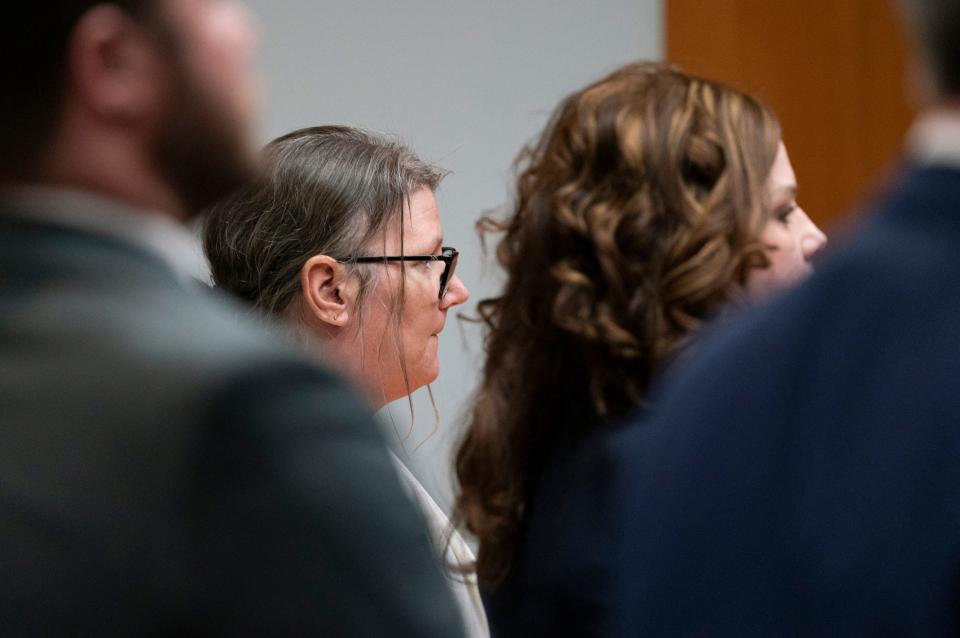Jennifer Crumbley guilty: Understanding involuntary manslaughter charge, possible sentence
The crime of involuntary manslaughter under which Jennifer Crumbley was held criminally responsible for the deaths of four children her son murdered is the lowest category of homicide.
Involuntary manslaughter is defined as an unintentional killing that results from either recklessness or gross negligence. It does not require premeditation or intent.
In Crumbley's case, prosecutors had to prove that she engaged in gross negligence, which means she may not have been aware of the risk she was creating, but reasonably should have been aware of it.
Her son Ethan Crumbley pleaded guilty to murdering four students and injuring seven other people during a rampage at Oxford High School on Nov. 30, 2021. He used a gun his father took him to buy that Black Friday — four days before the shooting.
The shooter's mother was convicted Tuesday of four counts of involuntary manslaughter for the deaths of Madisyn Baldwin, 17; Tate Myre, 16; Hana St. Juliana, 14; and Justin Shilling, 17. Crumbley's husband, James, faces trial in March on identical charges.
The two definitions of involuntary manslaughter
There are two definitions of involuntary manslaughter, or more specifically, two theories under which it can be proven.
The first type of involuntary manslaughter occurs when someone recklessly or negligently commits an act that results in the death of another. Recklessness typically means a person was aware of the risk that they were creating, while negligence usually means the person is unaware, but reasonably should have been aware.

Another definition of involuntary manslaughter involves a failure to perform a duty, thereby causing the death of another.
What Jennifer Crumbley's jury had to determine
Both of these theories were presented to jurors in the Crumbley case. Specifically, here is what the jury had to decide that prosecutors proved beyond a reasonable doubt:
That Crumbley caused the deaths of four students by engaging in gross negligence. That she did it as a result of storing a gun and its ammunition in a manner that allowed her minor son to access the gun and ammo and use it to kill four people.
Or the mother caused the deaths of four students by failing to perform a legal duty.
The prosecution had to prove that she had a legal duty to the victims and that she failed to perform that parental duty as defined under Michigan law, which says parents have a must exercise reasonable care to control their minor children and to prevent them from intentionally harming others.
This form of involuntary manslaughter is tougher to prove as it involves proving these key elements:
That the parent knows or has a reason to know that they have the ability to control their minor child.
That the parent is aware of the necessity and opportunity for exercising such control — in other words, Crumbley knew her son was mentally ill and should have gotten him help, but did not, but rather bought him a gun instead. Proving this required that it was reasonably foreseeable that her son may shoot up his school when she sent him back to class after being summoned over a troubling drawing he had made on the morning of the shooting. It included a gun, and the words: "The thoughts won't stop. Help me."
That the parent willfully neglected to perform that duty, and by failing to do so was grossly negligent to human life. In other words, Crumbley willfully ignored her parental duties to control her son, and therefore caused the deaths of the four students killed in the 2021 Oxford High School massacre.
Jennifer Crumbley sentencing date
Crumbley faces up to 15 years in prison when she is sentenced on April 9 for her crimes. Her husband, James, goes to trial in March for identical charges.
Tresa Baldas: tbaldas@freepress.com
This article originally appeared on Detroit Free Press: Involuntary manslaughter sentence: Jail time Jennifer Crumbley faces

